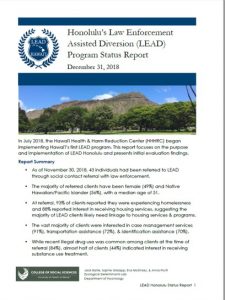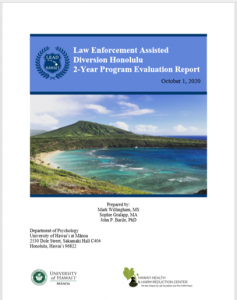Law Enforcement Assisted Diversion (LEAD)
Letting Everyone Advance with Dignity (LEAD) – formerly known as Law Enforcement Assisted Diversion – is a program designed to divert low-level offenders from citation and/or arrest, and increase connections to harm reduction based, individualized case management. The program involves a close partnership between social service providers and law enforcement. While LEAD is not specifically a program to reduce homelessness, a large percentage of individuals encountered by LEAD are individuals experiencing homelessness or individuals at imminent risk of homelessness. In 2021, LEAD announced a re-focus of its efforts on Oahu to concentrate on the Waikiki area — Honolulu Police Department (HPD) District 6 – in partnership with HPD and the Waikiki Business Improvement District Association (WBIDA).
Based on a National Model.
The local LEAD Pilots are based on the initial LEAD program launched in Seattle, Washington, which has since been replicated in multiple other communities nationwide. The local LEAD Pilots receive technical assistance and consultation from the LEAD National Support Bureau to ensure fidelity to the program model. In light of the Movement for Black Lives, the flagship LEAD program in Seattle is now known as Let Everyone Advance with Dignity, and new options are being developed for LEAD operations that decenter law enforcement as gatekeepers to LEAD while retaining traditional LEAD for jurisdictions where that itself represents a meaningful paradigm shift.
Initial Evaluation, Year One and Year Two Evaluations Highlight Early Results.
The University of Hawaii at Manoa, Department of Psychology conducted an evaluation of the first two years of LEAD in Hawaii, including the expansion of the pilot to Hawaii island, Maui, and Kauai. To read the evaluation findings, click on the icons below.
A Hui of Providers and Partners.
In addition to service providers and law enforcement, LEAD in Hawaii includes a coalition of over-25 organizations and government agencies that meet at least monthly. The monthly meetings include an overview of program outcomes, discussion about communication and outreach strategies, and discussions related to advocacy and program expansion.
Hawaii LEAD and Other Law Enforcement Partnerships Highlighted Nationally.
LEAD is one of a number of diversion programs initiated by Hawaii law enforcement to strengthen services for homeless individuals. The efforts of Hawaii law enforcement agencies to partner with homeless services was recently highlighted in a U.S. Interagency Council on Homeless and Council of State Governments joint policy brief on Strengthening Partnerships Between Law Enforcement and Homeless Services Systems.
Are there other examples of Law Enforcement Partnerships that assist persons experiencing homelessness?
Other examples including the Health, Efficiency, and Long-Term Partnerships (HELP) program that was launched by the Honolulu Police Department (HPD) on Oahu in August 2017. In addition, in Maui County, the Maui Police Department (MPD) administers the Critical Outreach and Response through Education (CORE) program, which includes a Mobile Medical Educational Unit. On Hawaii island, the Hawaii Police Department launched the Homeless Outreach Nurturing Our Community (HONOUR) program in 2019 to integrate persons experiencing homeless individuals back into the community by engaging them in volunteer work projects.
How to learn more about LEAD?
To learn more, please view the above video with Hawaii Health & Harm Reduction Center Program Manager David Shaku below, or contact (808) 521-2437.



